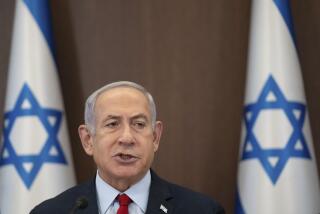Premier Bows to Soviet Assembly on His Nominees
- Share via
MOSCOW — Premier Nikolai I. Ryzhkov, bowing to the authority of the Soviet Union’s newly strengthened legislature, withdrew six of his ministerial nominees Tuesday after they had been rejected by the committees of lawmakers that had examined their qualifications and proposed programs.
Ryzhkov, speaking with reporters after the session of the Supreme Soviet, said that he could not defend these nominees and would propose others in their places.
“I agreed actually with the conclusions of the parliamentary committees,” he said. “I could not see any substantial proof that would enable me to defend them.”
This was the first time that the country’s elected representatives had scrutinized prospective ministers with any vigor, and their success in forcing Ryzhkov to withdraw his nomination of the six they consider unqualified was an important precedent in establishing the Supreme Soviet’s authority over the executive branch of the government.
Those rejected included the proposed chairman of the State Bank of the Soviet Union, the longtime chairman of the State Committee on Physical Culture and Sports, the current minister of culture and nominees to head the Oil and Gas Ministry, the Water Resources Ministry and the State Prices Committee.
They had been attacked as unskilled in their jobs, politically insensitive and bureaucratic in style.
In addition, two other nominees--one who would have been the first deputy premier responsible for agriculture and the other who would have headed the Machine Tool and Instrument Ministry--withdrew their names in anticipation of defeat. A third, the chairman of the state ecology commission, refused even to accept the nomination.
These were already among the country’s most powerful men, and their unprecedented defeat underscores the fundamental political shifts now under way here.
The whole process of legislative hearings on their qualifications and proposed programs is also seen as a major step to raise the competency of top government officials and to make them answerable for their policies to the Supreme Soviet.
“I would not say that they were bad specialists or incompetent,” Ryzhkov said of those who were rejected. “They simply did not meet demands in one area or another. Now, we have to think about new candidates.”
Leonid I. Abalkin, an influential economist who was named deputy premier for economic policy, supported Ryzhkov’s action. “The decision to withdraw was right for all six candidates,” he said after the session. “These were not the best people he could have chosen.”
Ryzhkov had said late last week that he would fight for several of the nominees who, he asserted, had been the “victims of emotions” during the often heated committee debates. But in the end he apparently decided to avoid what would have been a bruising political battle and to establish a working relationship with the Supreme Soviet.
He went further during the day’s debate and pledged to support new legislation that would provide for an annual no-confidence debate, a feature of many Western parliaments, in order to provide a regular review of the government’s policies.
With that, the Supreme Soviet approved the balance of Ryzhkov’s 70-member Cabinet, more than half of whom oversee sectors of the Soviet Union’s state-owned, state-run economy.
Now a full-time legislature with broad powers and no longer a “rubber stamp” for ratifying Communist Party decisions, the Supreme Soviet is made up of two houses with a total of 542 members elected from the larger Congress of People’s Deputies, which was given “supreme state authority” under President Mikhail S. Gorbachev’s political reforms.
The new ministers will be paid the equivalent of $1,230 a month, about four times the average Soviet wage, Ryzhkov told deputies, but they could earn up to 50% more with bonuses through meeting performance goals.
The Supreme Soviet is scheduled to meet until early August with a 21-point agenda that includes new laws on consumer protection, inventions, court reform, the press, taxes, revision of the criminal code and other measures.
More to Read
Sign up for Essential California
The most important California stories and recommendations in your inbox every morning.
You may occasionally receive promotional content from the Los Angeles Times.













